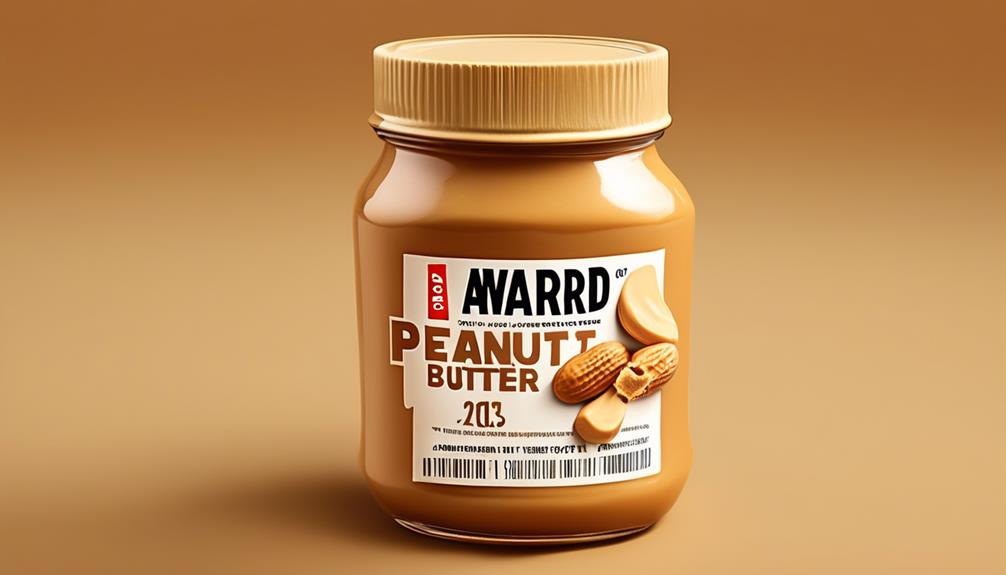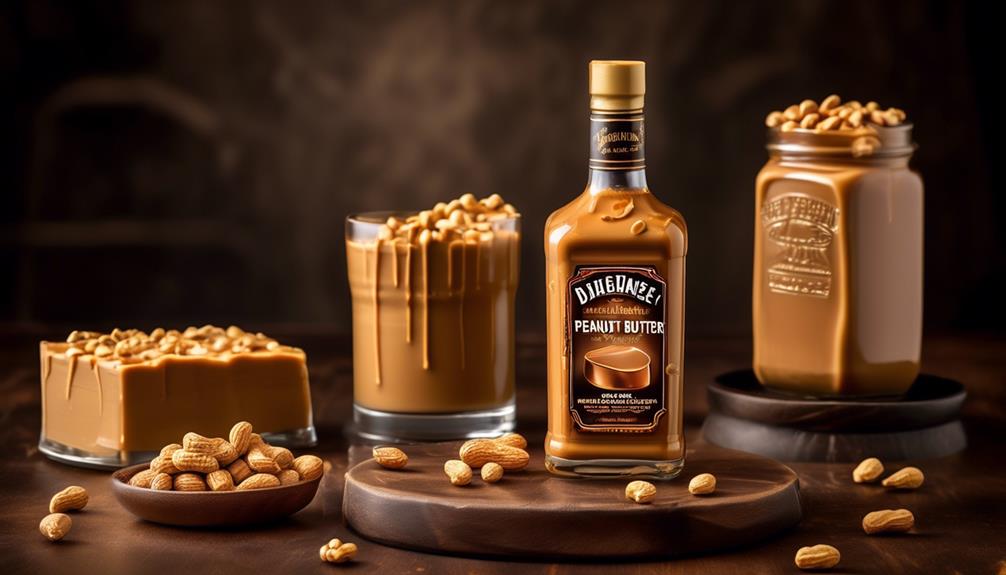Have you ever discovered an old jar of peanut butter in the back of your pantry and thought, can we still eat this?
The answer might surprise you. As we explore the intriguing topic of the shelf life of peanut butter, we'll uncover the potential risks and benefits of consuming expired peanut butter.
So, how long is too long when it comes to indulging in that forgotten jar of creamy goodness?
Let's delve into the details and find out.
Key Takeaways
- Unopened conventional peanut butter with stabilizers can last up to 9 months in the pantry.
- Storing peanut butter in the refrigerator can extend its shelf life, especially for natural peanut butter.
- Signs of expired peanut butter include a rancid smell, change in appearance, mold growth, excessive oil separation, and off-flavors.
- Properly stored expired peanut butter with no signs of spoilage is generally safe to eat, but any dryness, off-putting smell or taste, visible mold should be discarded.
Shelf Life of Peanut Butter
When assessing the shelf life of peanut butter, it's essential to consider various factors such as the presence of stabilizers, storage conditions, and the type of peanut butter being examined.
Unopened conventional peanut butter, containing stabilizers like palm oil and hydrogenated oils, can last up to 9 months in the pantry. However, once the jar of peanut butter is opened, its shelf life decreases.
Opened conventional peanut butter can last up to 3 months in the pantry and up to 9 months in the refrigerator. On the other hand, natural peanut butter without stabilizers has a shorter shelf life, lasting up to 6 months in the refrigerator.
The high fat content in peanut butter makes it prone to spoilage, specifically due to the oxidation of peanut oil, resulting in rancid peanut butter. Storing peanut butter in the refrigerator can extend its shelf life, especially for natural peanut butter due to the absence of stabilizers.
It's crucial to discard any peanut butter, whether unopened or opened, if it shows signs of spoilage, such as a metallic, bitter, or stale smell, dark and dried-out appearance, or mold growth in the case of natural peanut butter.
We must adhere to the recommended timeframes for consuming opened peanut butter, ensuring its quality and safety.
Signs of Expired Peanut Butter

After assessing the shelf life of peanut butter, it's crucial to recognize the signs of expired peanut butter to ensure its quality and safety. When it comes to checking if your peanut butter has expired, there are a few key indicators to look out for:
- Rancid smell: Spoiled peanut butter may have a metallic, bitter, or stale odor.
- Change in appearance: Look for darker color and dryness in the peanut butter, indicating spoilage.
- Mold growth: Natural peanut butter may develop mold, a clear sign of spoilage.
- Oil separation: Normal in natural peanut butter, but an excessive amount could indicate spoilage.
- Taste test: A sharp or bitter flavor suggests that the peanut butter has gone bad.
Being aware of these signs is essential for determining the quality and safety of the peanut butter. Checking for these indicators can help prevent consuming peanut butter that has passed its best quality period.
Always remember to store peanut butter properly and be vigilant in monitoring its shelf life to enjoy it for as long as possible.
Safety of Consuming Expired Peanut Butter

Properly stored expired peanut butter may still be safe to consume if it exhibits no signs of spoilage, such as changes in texture, color, smell, or taste. Before consuming expired peanut butter, it's essential to assess its condition to ensure safety. Here's a table to help you understand the safety of consuming expired peanut butter:
| Signs of Spoilage | Safety of Consuming Expired Peanut Butter |
|---|---|
| Changes in texture | Properly stored: Safe to eat |
| Changes in color | Properly stored: Safe to eat |
| Changes in smell | Properly stored: Safe to eat |
| Changes in taste | Properly stored: Safe to eat |
| Dry appearance | Not safe – should be discarded |
| Off-putting smell or taste | Not safe – should be discarded |
| Visible mold | Not safe – should be discarded |
When assessing the safety of consuming expired peanut butter, always use your best judgment. If the peanut butter shows no signs of spoilage and has been stored correctly, it is generally safe to eat. However, if it appears dry, has an off-putting smell or taste, or shows visible mold, it should be discarded to avoid potential health risks.
Storage Tips for Extending Peanut Butter's Lifespan

How can we optimize the storage conditions to prolong the shelf life of peanut butter? Proper storage is crucial for extending the lifespan of peanut butter and maintaining its quality. Here are some key tips for maximizing the shelf life of this beloved spread:
- Cool and Dry Environment: Store peanut butter in a cool, dry place such as a pantry to prevent exposure to heat and moisture, which can cause it to spoil more quickly.
- Airtight Containers: Transfer peanut butter into airtight containers to minimize air exposure, which can lead to oxidation and rancidity.
- Avoid Direct Sunlight: Keep peanut butter away from direct sunlight to prevent temperature fluctuations and preserve its flavor and texture.
- Check Expiration Date: Regularly check the expiration date and consume the peanut butter before it expires to ensure freshness and quality.
- Avoid Additives: Opt for natural peanut butter without added preservatives or stabilizers, as these can affect the product's shelf life and overall quality.
Creative Uses for Expired Peanut Butter

To make the most of expired peanut butter, it's valuable to explore alternative uses that align with sustainability and practicality, leveraging its properties beyond traditional consumption. When peanut butter reaches its expiration date, it doesn't necessarily mean it has to go to waste.
There are several creative ways to repurpose expired peanut butter, thus extending its shelf life and reducing unnecessary waste. One of the best ways to utilize expired peanut butter is as bait for traps or to attract wildlife for observation. Its strong aroma can be a powerful attractant.
Additionally, expired peanut butter can be used as a lubricant for squeaky hinges or stuck zippers due to its oily nature. Furthermore, it can serve as a moisturizer for dry skin or be used to remove sticky residue.
Repurposing expired peanut butter as a homemade dog treat or bird feeder filling is also a practical and sustainable option. By exploring these creative uses for expired peanut butter, we can make the most out of its extended shelf life and contribute to reducing waste in a resourceful manner.
Frequently Asked Questions
Is It Safe to Eat Peanut Butter After Expiration Date?
Yes, it's generally safe to eat peanut butter after the expiration date, as long as there are no signs of spoilage. We should inspect it for any changes in smell, appearance, or taste. If it looks and smells okay, and there are no unusual flavors, it's likely safe to consume.
However, it's always best to use our discretion and practice food safety when consuming products past their expiration date.
What Foods Should You Not Eat After Expiration Date?
We should avoid consuming dairy products like milk, cheese, and yogurt after the expiration date, as they can pose health risks.
Fresh meat, poultry, and seafood can harbor harmful bacteria and shouldn't be eaten past the expiration date.
Deli meats, hot dogs, and pre-cut fruits and vegetables can also spoil quickly, posing risks of bacterial contamination and food poisoning.
It's crucial to be mindful of expiration dates to minimize health risks associated with consuming expired foods.
How Long Can You Use After Expiration Date?
We can use certain foods after the expiration date, but it's crucial to assess each item individually. Checking for spoilage signs like smell, texture, and appearance is essential.
For peanut butter, the expiration date indicates peak quality, not safety. If it looks, smells, and tastes fine, it's likely safe to consume even after the date. However, always practice caution and discard if there are any doubts.
Can You Eat Butter 3 Months Out of Date?
We've all been there, wondering if it's safe to eat something past its expiration date.
When it comes to peanut butter, it's crucial to consider the signs of spoilage. If the peanut butter looks and smells fine, it's likely safe to eat a few months past the expiration date. However, it's always best to trust your senses and discard it if it seems off.
Conclusion
In conclusion, it's crucial to be mindful of the shelf life and signs of spoilage when it comes to peanut butter. Consuming expired peanut butter can pose health risks, so it's best to discard it if it shows any signs of spoilage.
By properly storing and monitoring the condition of peanut butter, we can ensure its safety and enjoy its delicious taste without any concerns.
Just as we carefully monitor our peanut butter, let's also pay close attention to our well-being.









